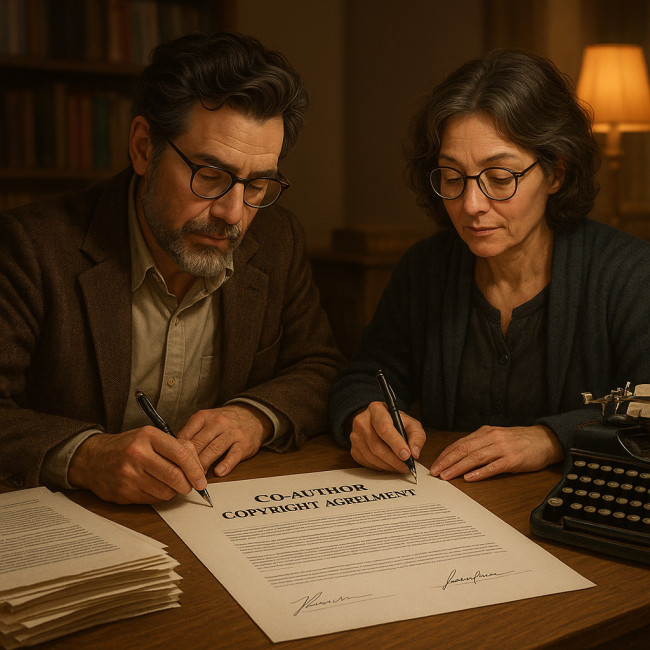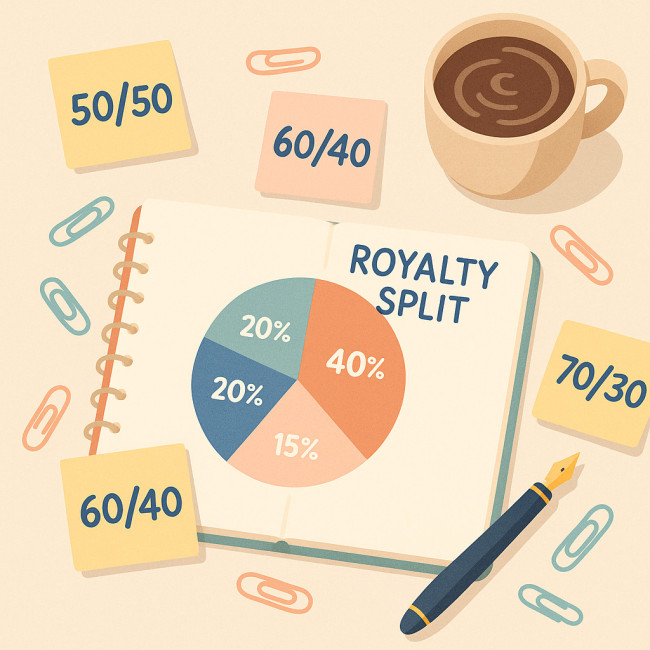Co-writing contracts: key clauses every author team must agree upfront
A co-writing contract is the safety net that keeps creative energy high and legal headaches low. Discover the six clauses successful author teams finalise before typing the first line: workload splits, copyright, royalties, credit, timelines, and conflict resolution. Walk away with actionable wording tips, a royalty-split graphic, and a quiz to test your readiness.
Why a co-writing contract is non-negotiable
Excitement can mask risk. Without a signed agreement, arguments about workload, revisions, or advances can land the project in limbo. Publishers, agents, and platforms increasingly ask for proof of a formal collaboration contract before greenlighting deals. Setting terms early preserves friendships and accelerates negotiations later.
Clause 1 – Division of labour and decision rights
List every task—research, drafting, redlining, marketing—and assign a primary owner. Specify decision rights for plot changes, character arcs, or marketing spend. A simple task matrix keeps responsibility clear and allows the team to invoice accurately against fair author day rates.
Sample task matrix
| Task | Primary | Secondary |
|---|---|---|
| Outline | Author A | Author B |
| First Draft | Both | — |
| Fact-checking | Author B | Author A |
| Marketing Plan | Author A | Author B |
Clause 2 – Intellectual property ownership

Unless stated otherwise, copyright is joint and indivisible. That sounds fair until one writer wants to license a film adaptation alone. Your contract should define whether rights are held “jointly” (both must consent to any exploitation) or “collectively” (either can license but must share proceeds). For additional IP such as maps, playlists, or online courses, reference specialised clauses like those in protect your IP.
Clause 3 – Royalty split and advance allocation

Money talk often turns awkward, yet it is easier before the first cheque arrives. Decide how publisher advances, Kickstarter funds, or platform payments will be divided. A common model is equal split, but many teams opt for weighted shares when one partner brings a bigger platform or invests more hours.
Source : Publishers Weekly
Clarify whether the advance is recoupable per author or against total earnings, and align royalty splits with workload commitments recorded earlier.
Clause 4 – Credit, byline, and pen names
Readers judge a title page in seconds. Agree on name order and whether a shared pen name will be used. The contract should also cover promotional materials: whose photograph appears on the jacket, and how both authors are introduced during media events. A mismatch can dilute branding efforts and undercut the traction you gain from clear briefing processes.
Clause 5 – Deadlines, milestones, and revision veto
Publishers rarely accept late deliveries. Build a timeline that includes first draft, beta reader feedback, and final line edit. Each milestone should list a “veto window” (for example, 72 hours) during which either author can reject changes. Tie milestone approval to partial payments if one writer carries more risk, similar to retainer-friendly agreements.
Clause 6 – Conflict resolution and exit strategies
Good fences make good co-authors. Specify a mediation step before any legal action. If one partner exits early, outline options: buy-out, ghostwriting status, or percentage reduction. Include a clause that prohibits either party from blocking exploitation unreasonably, protecting future income streams such as the collaboration listings on industry collaboration boards.
Template wording: quick reference
| Clause | Essential phrasing |
|---|---|
| Workload | “Parties shall divide tasks as per Schedule A and update said schedule in writing.” |
| IP Ownership | “Copyright in the Work shall be held jointly; no licence shall be granted without mutual consent.” |
| Royalties | “Net receipts shall be split 60 % Author A / 40 % Author B after deductible expenses.” |
| Credit | “Byline order: Author A & Author B. Both names to appear in equal font size.” |
| Disputes | “Any dispute shall be submitted to mediation before arbitration under WIPO rules.” |
Checklist before signing
- Confirm legal names and addresses match identification.
- Add schedules for timelines, tasks, and promotional commitments.
- Attach signature page with date, printed names, and witness if required.
- Store the signed PDF in a shared, version-controlled folder.
FAQ
- Do we need a lawyer to draft a co-writing contract?
- A lawyer is not mandatory but highly recommended for high-value projects or complex IP splits.
- Can we amend the contract mid-project?
- Yes, include a clause allowing written amendments signed by both parties to stay flexible.
- What happens if one author misses a deadline?
- Penalties or royalty adjustments can be triggered; outline them clearly to avoid disputes.
- Is a verbal agreement ever enforceable?
- In most jurisdictions, verbal agreements on copyright are weak; get everything in writing to protect both sides.
Quick self-test: Are you contract-ready?
Take action
Draft your contract today while enthusiasm is high. Adapt the template above, involve a publishing lawyer, and file the agreement before sharing chapters with beta readers. Solid terms now free you to focus on what matters most—writing a story readers can't put down.











